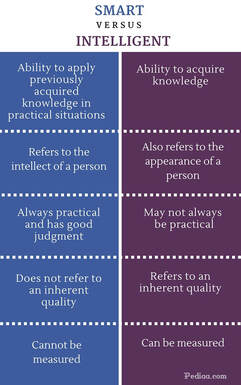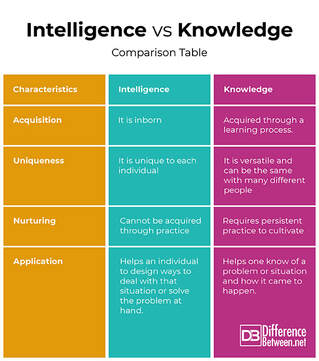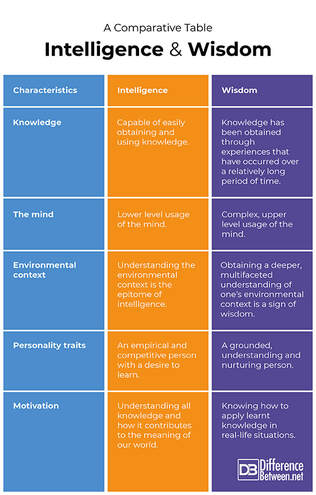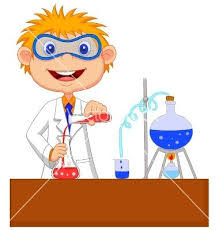Oh? You’re surprised there’s anything to question? Well, think about it. What does “smart” really mean? It is akin to the words writers search their manuscripts for -- so they can be eliminated. Big, small, pretty. Indistinct almost to the point of uselessness.
“Ahh…I’m kinda real smart…I think.”

Ask your kids or grandkids how they know someone is smart. You’ll hear things like:
“School is easy for them.”
“They finish tests fast.”
“They never have to study.”
“They already know everything.”
“They can memorize anything.”
“They read all the time.”
Are those the characteristics you mean when you say someone is “smart”?
SMART
One dictionary defines the word as: “having or showing a quick-witted intelligence.” The Merriam-Webster definition of Smart is, “Having an alert mind.” The synonyms listed are “witty”, “clever”, “bright”, and “appealing to sophisticated taste.” I’m not sure what this last one means.
 Setting aside the definitions of Smart related to making sarcastic or sassy remarks or being well dressed, Smart can be defined as an earned status which infers that effort was put in to learn. Studying and learning makes an individual smarter (more informed and aware) in relation to a specific subject matter, either book smart, like mathematics, or street smart, like how to slit someone’s tires without getting caught. |
SMART VS. INTELLIGENT
Intelligence is a different matter. Our friend Merriam-Webster defines Intelligence as “the ability to learn or understand or to deal with new or trying situations, and is also the skilled use of reason.”

Intelligence is something you have or don’t have and cannot be taught. It is based on the speed with which your brain makes connections, how easily you understand emotions, and how your memory and memory retrieval system works.
In terms of measure on intellect, intelligence is a higher level than smart. While the word also suggests a higher level of education and more exposure to learning, that isn’t necessarily true. People can be highly intelligent without being educated.
However, within today’s education systems, one assumes there is a certain amount of intelligence required to complete courses at an institution of higher learning.
Source of Chart: http://pediaa.com/difference-between-smart-and-intelligent/
Intelligence is a gift of nature.

The experts seem to agree that Intelligence refers to one’s potential to acquire and apply knowledge. Knowledge refers to information and facts, as well as skills, that one acquires through either education or experience undertaking a certain task; the understanding related to a specific subject. Knowledge forms its existence around an idea, statement, or event, and is, therefore, contextual. I again called on Merriam-Webster for the definition of Knowledge.
1.a. The fact/condition of knowing something with familiarity gained through experience or association;
acquaintance with or understanding of a science, art, or technique.
1.b. The fact/condition of being aware of something; the range of one's information or understanding.
1.c. The circumstance/condition of apprehending truth/fact through reasoning.
1.d. The fact/condition of having information or of being learned.
Because intelligence is linked to one’s capabilities more than to what and how much a person knows, I see a strong relationship between being smart and being knowledgeable. Both require accumulating information and skills through study, learning and, in the case of skills, practice. Neither one is a gift of genetics.
It is important to remember that intelligence is not necessarily linked to the morals of an individual. Many criminals are highly intelligent and use their intelligence to break the law. Also, intelligence is not tied to memory. Intelligent people can have poor memories.
Source of Chart: http://www.differencebetween.net/language/difference-between-intelligence-and-knowledge/

“Beneficial only if applied.”
“Its values may change over time.”
“Developed through a learning process.”
“Knowledge is dynamic.”
“Depends on memory, expertise, exposure, past
experiences, opportunities, and the transfer mechanisms.”
The difference between intelligence and knowledge is that the former, Intelligence, is inborn and unique to each individual. Knowledge is acquired through experience, training, books, practice, materials, and research and is an ongoing process.
Knowledge can be the same in different people.
| INTELLIGENT VS. EDUCATED Merriam-Webster lets me down on this one. Educated is defined as “having an education.” Well, yes. That’s correct, and I can’t argue with it, but I really hate it when a word is used to define itself. | |

I see the condition of being educated similar to acquiring knowledge by studying and learning, so I’m going to use Knowledgeable/Educated even though there may be subtle differences.
Intelligence and wisdom are abstract concepts and difficult to comprehend, and they are both attributes of the mind that inevitably cross paths. Unless you were raised by wolves in the deepest forest, and probably even then, it’s impossible to imagine an intelligent person living an entire lifetime without gaining some wisdom.
Although the terms are sometime used interchangeably, there are clear observable differences linked to the way the brain operates on a lower and upper level. The lower level of the mind is highly rational and predominantly concerned with our immediate environment. The upper level of the mind, in contrast, engages in higher order thinking by connecting knowledge from mental, emotional, and physical experiences. Lower-level and higher-level thinking are
inked to intelligence and wisdom respectively. Source: http://www.differencebetween.net/language/differences-between-intelligence-and-wisdom/

Characteristically, wisdom is the ability to determine the truth and validity of accumulated knowledge which usually comes from undergoing negative and positive experiences that develop one’s values and moral compass. Therefore, wisdom is the pairing of one’s accumulated knowledge and the capability to synthesize this knowledge using their moral understanding of the world.
Although wise people often have a personal growth’ mentality, a characteristic of most spiritual and religious practices, neither intelligence nor wisdom is tied to spirituality just as it is independent of moral grounding.
Experts indicate it is impossible to be exclusively wise or exclusively intelligent. Most people will exhibit characteristics of both, often within different areas of interest, and both affect how a person engages with their immediate physical environment. Wise people often relate to the world by understanding the variation of possibilities and opportunities that contribute to obtaining knowledge.
A wise individual is often self-aware and a firm believer in striving for what that individual believes is right.

Ian, at [email protected] asks us – begs, maybe – to ditch the word Smart, because it’s too vague, and give compliments to children in particular, and others, based on specifics. He suggests praise like:
“You made an unexpected connection!”
- “You understood that very quickly.”
- “You used some information that no one else knew!”
- “You noticed something that I didn’t notice.”
- “You explained that idea so clearly, a five year old could understand it.”
Sources:
https://www.byrdseed.com/what-is-smart/
https://www.byrdseed.com/the-burden-of-being-called-smart/?icn=srs
https://answers.yahoo.com/question/index?qid=20100101144308AAz1haK
http://www.differencebetween.net/miscellaneous/difference-between-smart-and-intelligent/
http://www.differencebetween.net/language/difference-between-intelligence-and-knowledge/
http://www.differencebetween.net/language/differences-between-intelligence-and-wisdom/
pediaa.com/difference-between-smart-and-clever/
https://www.englishforums.com/English/IntelligentVsSmart/vqhmr/post.htm
https://www.theodysseyonline.com/what-does-being-smart-really-mean
https://cathcart.com/media-press/motivation-articles/7-intelligences-what-does-it-mean-to-be-smart/
http://pediaa.com/difference-between-smart-and-intelligent/




 RSS Feed
RSS Feed